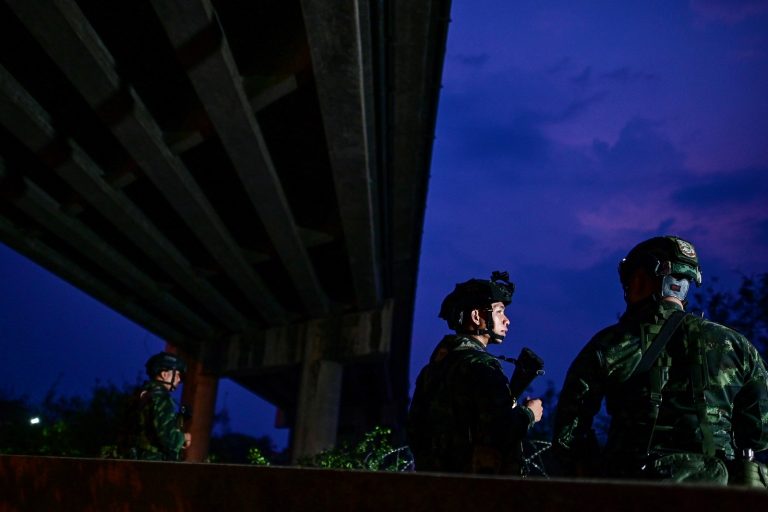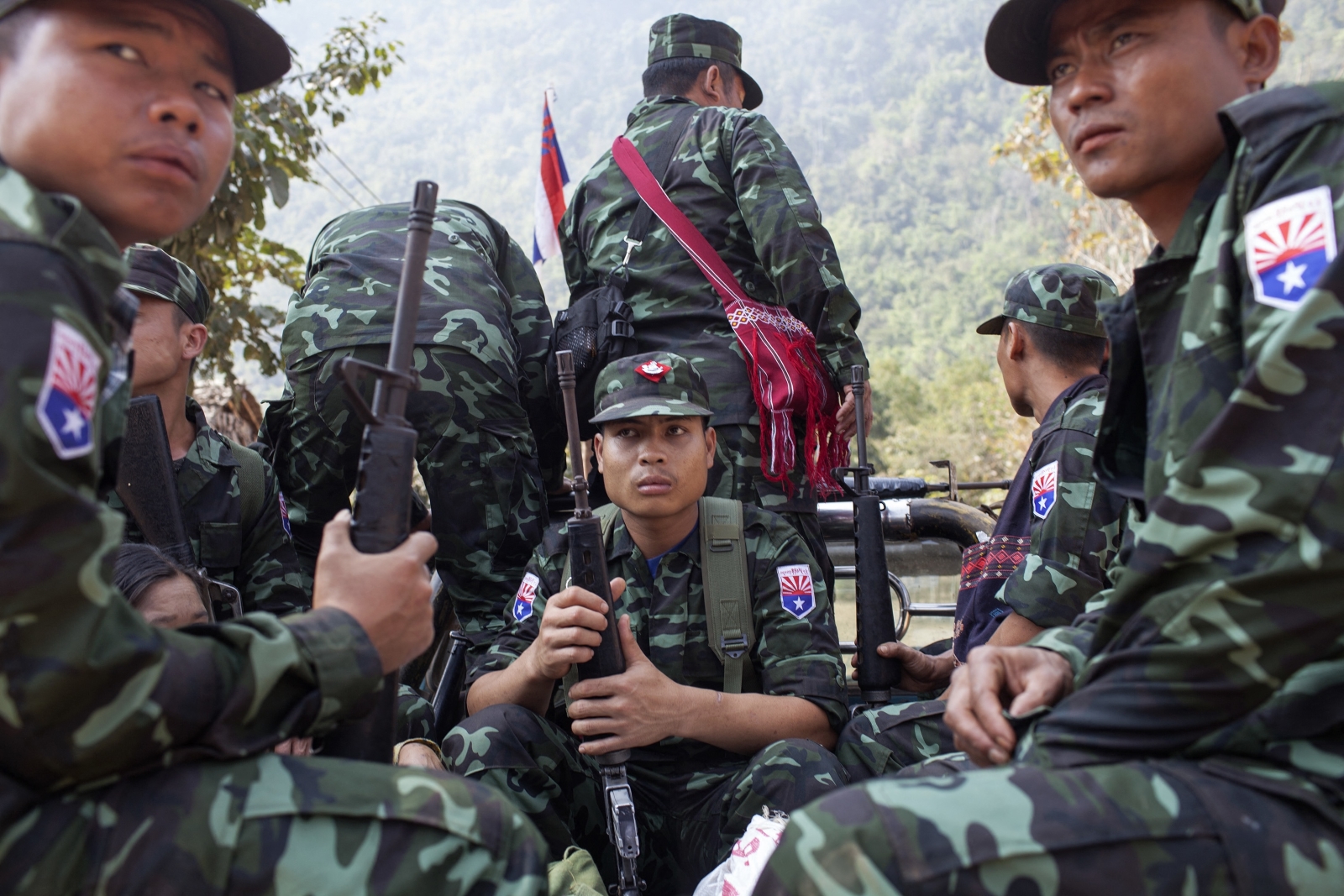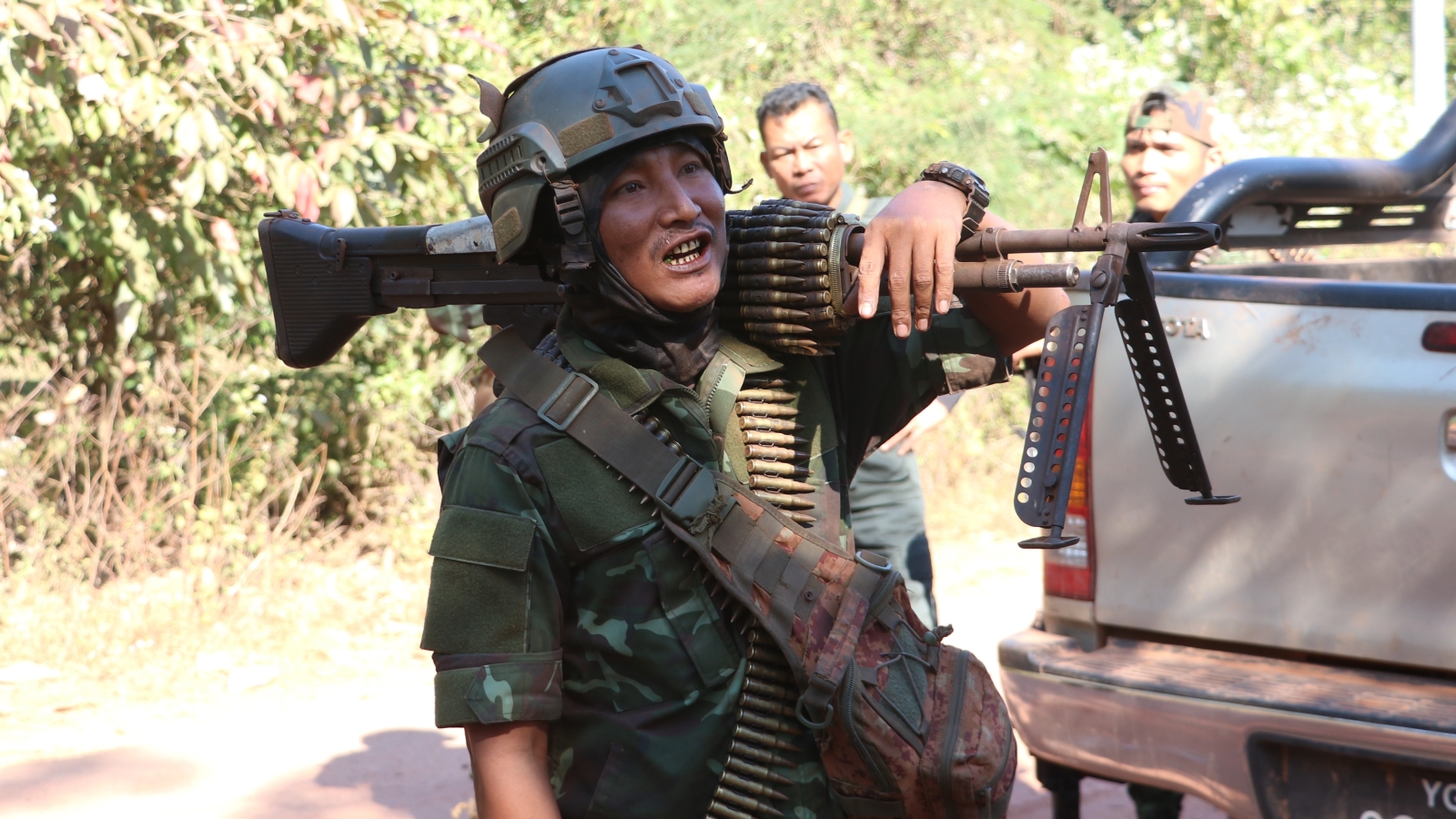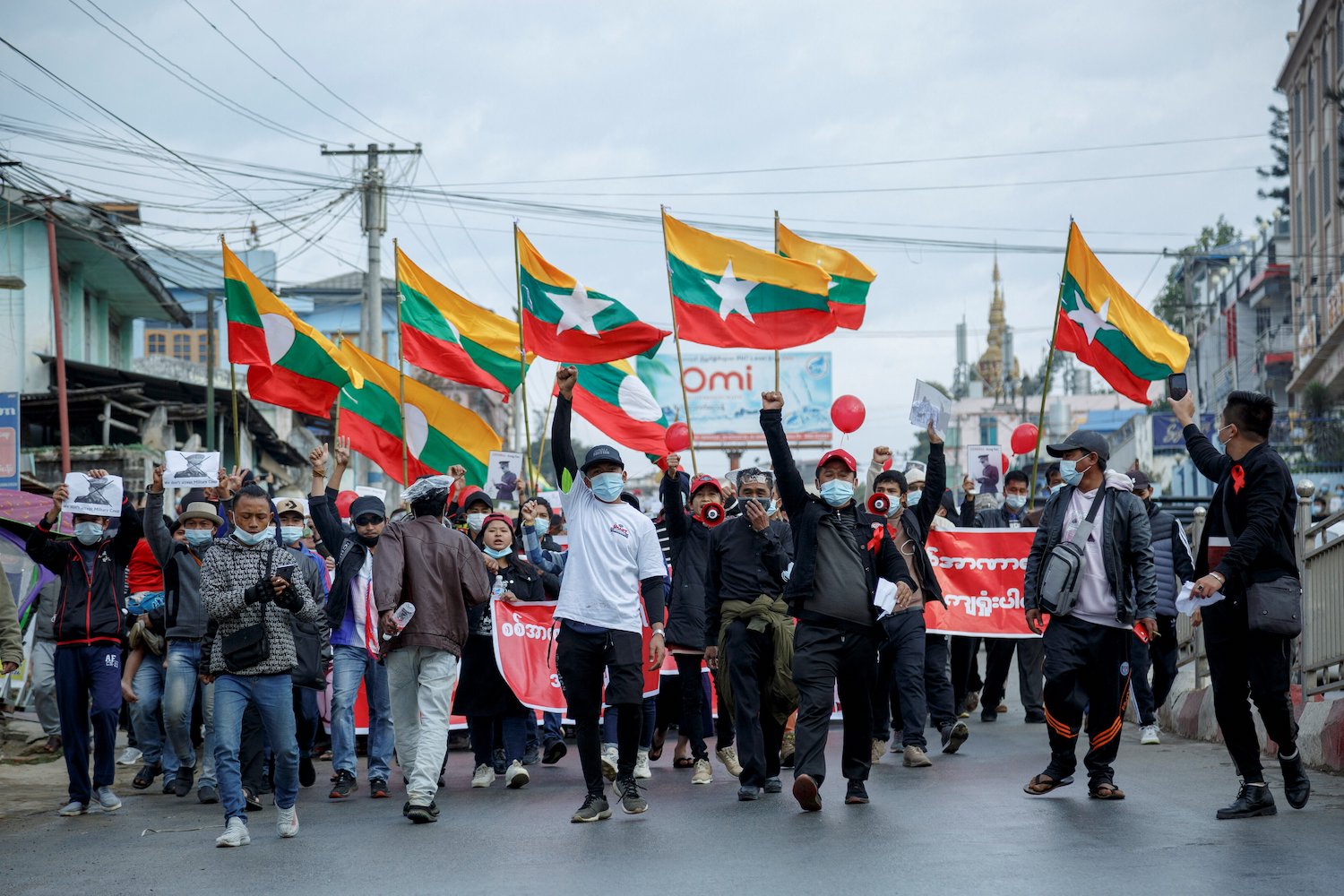The Kayin State Border Guard Force announced its separation from the Myanmar military, and is trying to rehabilitate its rights-abusing reputation, but new financial pressures have only deepened its dependence on the cyber scam industry.
By NAW BETTY HAN | FRONTIER
Like other businessmen operating in the Shwe Kokko border enclave, hotelier and restaurateur U Aik Kyaw* was nervous when the Kayin State Border Guard Force called an “emergency meeting” in November last year.
“They didn’t say much about what would be discussed at the meeting beforehand,” he said. “We thought the BGF was going to declare some sort of emergency, because it was all organised so quickly.”
The Kayin BGF, which was incorporated into military command in 2010, was rattled by Operation 1027, a stunning offensive launched by a trio of ethnic armed groups in late October. The Three Brotherhood Alliance seized significant territory in northern Shan State, wiping out the Kokang BGF in the process.
The Brotherhood groups receive support from Beijing, and the offensive in northern Shan was justified as a crackdown on the out of control cyber scam industry there. Now, the highest concentration of scam centres in Myanmar is believed to be in Kayin State, with many of the major ones linked to the Kayin BGF and its business partner, Yatai International, chaired by a Chinese fugitive jailed in Thailand.
In the past few years, the industry largely relied on forced labour trafficked from China to scam other Chinese nationals. In Myanmar, the scam centres are typically run by Chinese gangsters in cooperation with armed groups providing protection.
Aik Kyaw described the November meeting as a “preliminary warning” to business owners involved in the scam industry.
“They were warning them that they would crack down soon,” he said, adding that the BGF pledged to continue to safeguard the area against outsiders – both the Myanmar military and other ethnic armed groups.
But as is often the case with the scam industry, what followed was more of an adaptation than a crackdown, showing the continued flexibility of a criminal enterprise believed to generate billions annually in Southeast Asia.
Sources in Shwe Kokko said some operations were indeed temporarily suspended or relocated, but by February had roared back to life. Meanwhile, the BGF’s recent decision to separate from the Myanmar military means it must now support itself financially, largely in the form of taxing businesses and individuals involved in online gambling and scamming, only deepening its dependence on the illegal industry.
Shifting sands
In January, in a blow to the junta, the BGF announced it was cutting ties with the military, and would no longer accept salaries from it or lead its battles in Kayin. But Aik Kyaw said local business owners were told of this decision in December, not long after the emergency meeting.
The junta scrambled to dispatch high-level officials to negotiate. Information minister Maung Maung Ohn and Kayin State Administration Council chairman Soe Myint Oo met with BGF leader Colonel Saw Chit Thu in the state capital Hpa-an on January 11 and 18, urging him to keep the BGF under the military’s command, a BGF source who asked not to be named told Frontier.
“Maung Maung Ohn, who is a good friend of Saw Chit Thu’s, asked what was going wrong with our relationship with Nay Pyi Taw, but Saw Chit Thu just insisted that the Karen BGF will no longer operate under the control of the military – that it would be independent,” the source said.
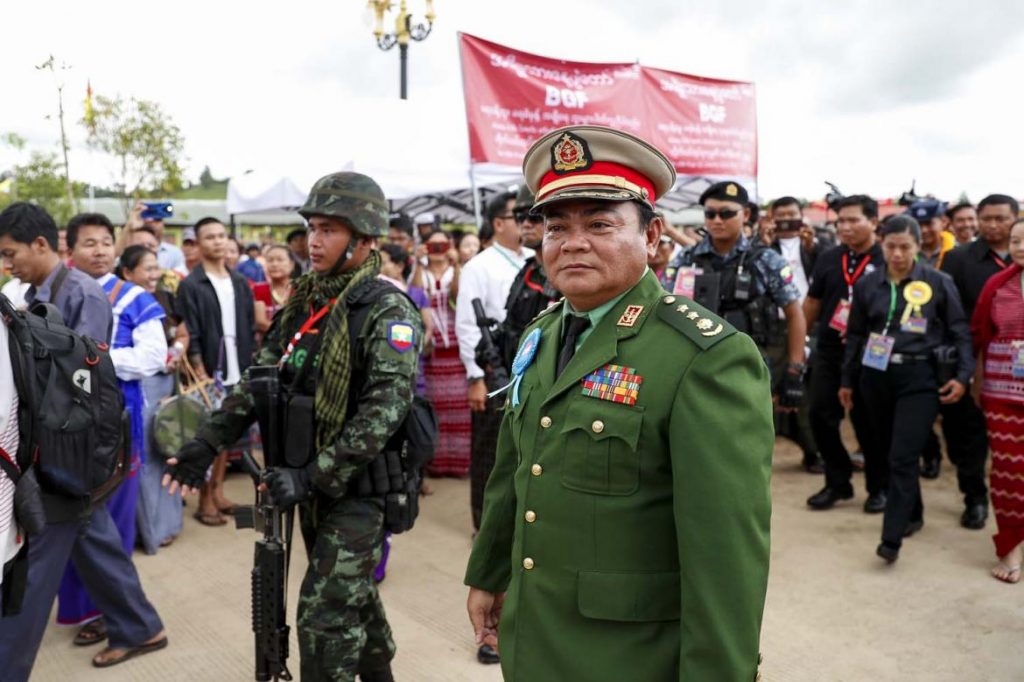
The regime then turned to deputy leader Vice Senior General Soe Win, who was flown into Hpa-an on a military helicopter on January 23.
The BGF source said Soe Win again requested that the BGF continue taking salaries from the regime and leading its operations in Kayin. But he also demanded that the BGF not participate in illegal gambling or scamming, give the regime access to inspect Shwe Kokko and other parts of Myawaddy Township for illegal activities if requested, and let the military take the lead on defending Shwe Kokko if it comes under attack the way Kokang did.
The last proposal may have spooked the Kayin BGF more than reassured it, given the military handed over wanted Kokang BGF leaders to China after Operation 1027. In the end, no agreement was made and Chit Thu doubled down on BGF independence.
“Mainly, our leader couldn’t agree to Tatmadaw demands that we lead the fight against other Karen groups for them, or that we allow the military to inspect casinos on the border whenever they please. Under these conditions, the BGF may as well not exist,” the source said. “Most ground troops are sick and tired of fighting other Karen people.”
This wouldn’t be the first time scams and illegal gambling have come between what was otherwise a mutually beneficial partnership.
After the civilian government announced an investigation into Shwe Kokko in 2020, the military demanded that BGF leaders end their involvement in illegal gambling or resign. But when the military overthrew the elected government in February 2021, Myanmar’s oldest ethnic armed group, the Karen National Union, began training and arming new pro-democracy resistance groups. The newly-constituted junta walked back its demands, allowing the BGF to remain in control of the illicit economy in Shwe Kokko in exchange for support on the battlefield.
This time, however, the junta finds itself out in the cold, at a time when Karen groups long at odds may finally be starting to unify. Major Naing Maung Zaw, spokesman for the BGF, confirmed to Frontier on March 6 that the group will separate from the military and rebrand as the Karen National Army.
“All BGF commanders agreed and we are working to officially inform all BGF troops. We are currently removing and changing the BGF arm badges as well. In some units, the arm badges have already been changed,” he said.
Unlike the former BGF in Kayah State that helped the resistance seize Mese Township after defecting, the KNA said it won’t take the fight to the Tatmadaw.
“The purpose of the newly formed KNA is to prioritise stability and peace in our region. We will not go on the offensive against the military council. However, if the military council attacks us, we will not sit back and remain silent,” Naing Maung Zaw said.
The anonymous BGF official confirmed that the group had withdrawn from camps inside KNU territory since the last week of February and collaboration with the regime has ended. He said Chit Thu’s decision to split with the military followed informal consultation with other senior officers – and that it’s a decision widely backed among the BGF rank and file.
“We all support this decision. We are in a position to stand on our own territory with our own manpower, so there is no reason to continue as a branch of the military,” he said.
Even just withdrawing from KNU territory may have proven to be a major boon for the anti-regime resistance, allowing the KNU and its allies to focus on other targets. Days ago, reports emerged that the coalition seized a major military base near the vital trade town of Myawaddy, on the Thai border, and are negotiating the surrender of the remaining troops there.

Finding the funds
But splitting from the military means BGF leadership must find another way to pay the salaries of their troops – about 7,000 Thai baht (US$190) for each of their roughly 4,000 soldiers per month, plus food rations.
In order to support these costs, local workers and businessmen say the BGF has started demanding taxes from individual employees in Shwe Kokko, in addition to the usual 10 percent tax on businesses. In February, the BGF’s main business partner Yatai said all employees must pay a one-time fee of 8,890 baht, followed by a regular tax of 1,000 baht per month.
“It wasn’t written in the statement, but we were told at work that this money goes to the BGF,” said Ko Htet*, who earns 45,000 baht per month working for a company linked to Yatai that’s involved in scamming and online gambling.
Ko Htet said the industry in Shwe Kokko has adapted since the launch of Operation 1027. He said new hires are subjected to more “scrutiny”, including signing a contract agreeing not to post any pictures on social media, and are told to represent themselves as working for online gambling companies, not scam companies.
The separation between online gambling and scamming is murky at best. One common scam format lures victims to bet on online games, where the outcome is not random but predetermined by an algorithm. Sometimes they win small amounts to tempt them to continue betting, until they lose a bigger sum.
Ko Htet also said there’s been a notable decline in rights abuses in the Shwe Kokko compounds he’s familiar with, like physical abuse of workers, forced overtime or withholding meals.
“I noticed that it started to change last November,” he said – soon after Operation 1027 and the BGF emergency meeting.
But recent testimony from a group of Ugandans who were freed from a scam centre in Kayin, run by an unknown armed group, still described “slave-like” conditions with 17 hour workdays and withheld meals.
Mr Jason Tower, Myanmar country director for the United States Institute of Peace, said scam centres in the area are “ramping up efforts to whitewash their criminal activity”.
He said in December last year, Yatai “issued a public notice that it would no longer permit torture equipment including tasers, handcuffs and illegal knives inside the zone”.
“Meanwhile, much more strict protocols have been put in place inside the compound to prevent cyber-slaves from contacting rescue organizations, and to deter them and their families from going to the police. This includes rolling out more strict surveillance of online activity inside the compounds, as well as beefing up security inside the compounds,” he said.
Mr Jacob Sims, a leading independent expert investigating the scam industry, said despite these PR campaigns, he has observed no broad trend away from repression in the scam compounds.
“As a general rule though, the violence in Myanmar has been particularly bad and from my sources, I don’t see any evidence of that changing in BGF territory or elsewhere where the industry persists at scale,” he said.
Instead, he said the biggest change since Operation 1027 has been a shift away from Mandarin speaking scam and trafficking victims to avoid the wrath of Beijing.
“Accordingly, in both Myawaddy and Cambodia, we are seeing a massive acceleration of English-speaking victims,” he said.

Tower said even the KNA rebrand may be more surface-level than it appears, saying the BGF has sent “mixed signals regarding its affiliation with the Myanmar military”.
“Such positioning is helpful for the military, as it enables the military to argue that the scam syndicates are outside of its control; meanwhile, this is helpful for the BGF in preventing the emergence of an operation 1027 style crackdown headed by other ethnic armed organizations in the area,” he said.
Migration patterns
Sims said there has also been a physical shift away from northern Myanmar after the Operation 1027 crackdown.
“However, it is also important to note that the geographic displacement has been almost exclusively to places where the industry is already comfortably entrenched,” he said, like Myawaddy Township and Cambodia.
Ko Htet also confirmed that many workers from illegal gambling and online scam centres based in northern Shan had relocated to Shwe Kokko following Operation 1027, while others have been driven there from the Myanmar heartland by the recently announced military conscription law.
Many young men between the ages of 18 and 35 have fled to neighbouring countries or resistance controlled territories to avoid conscription, but some of those who could not afford to have come to border areas to work.
“Our company has more than 50 new, young hires. At this pace, the BGF will make a lot of money taxing new workers,” Ko Htet said.
“We screen all those who come to make sure they’re actually able to work,” said Naing Maung Zaw from the BGF. “We will foster the growth of human resources to help develop Shwe Kokko.”
In another apparent attempt to appease China, the BGF handed over 997 foreigners working in scam centres in late February and early March, although it’s not clear if that included any ring-leaders, or just trafficking victims.
“Thailand was temporarily accepted as a host and then they were sent back to China. Most of them were Chinese citizens,” Naing Maung Zaw said.
Just prior to that exchange, senior BGF representatives met with Chinese officials in Thailand, according to the BGF official who did not wish to be named.
In February, Aik Kyaw said the casino industry had quieted down in the immediate aftermath of Operation 1027, but by now has roared back to life.
“People are back and business is back. However, the BGF has told us that it’s only online gambling, not online scams. But we can’t visit or inspect the businesses, so we only know what they say.”
*indicates the use of a pseudonym for security reasons



